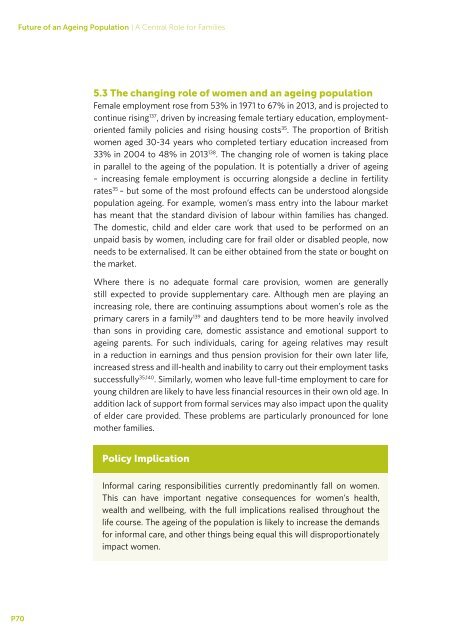Future of an Ageing Population
gs-16-10-future-of-an-ageing-population
gs-16-10-future-of-an-ageing-population
Create successful ePaper yourself
Turn your PDF publications into a flip-book with our unique Google optimized e-Paper software.
<strong>Future</strong> <strong>of</strong> <strong>an</strong> <strong>Ageing</strong> <strong>Population</strong> | A Central Role for Families<br />
5.3 The ch<strong>an</strong>ging role <strong>of</strong> women <strong>an</strong>d <strong>an</strong> ageing population<br />
Female employment rose from 53% in 1971 to 67% in 2013, <strong>an</strong>d is projected to<br />
continue rising 137 , driven by increasing female tertiary education, employmentoriented<br />
family policies <strong>an</strong>d rising housing costs 35 . The proportion <strong>of</strong> British<br />
women aged 30-34 years who completed tertiary education increased from<br />
33% in 2004 to 48% in 2013 138 . The ch<strong>an</strong>ging role <strong>of</strong> women is taking place<br />
in parallel to the ageing <strong>of</strong> the population. It is potentially a driver <strong>of</strong> ageing<br />
– increasing female employment is occurring alongside a decline in fertility<br />
rates 35 – but some <strong>of</strong> the most pr<strong>of</strong>ound effects c<strong>an</strong> be understood alongside<br />
population ageing. For example, women’s mass entry into the labour market<br />
has me<strong>an</strong>t that the st<strong>an</strong>dard division <strong>of</strong> labour within families has ch<strong>an</strong>ged.<br />
The domestic, child <strong>an</strong>d elder care work that used to be performed on <strong>an</strong><br />
unpaid basis by women, including care for frail older or disabled people, now<br />
needs to be externalised. It c<strong>an</strong> be either obtained from the state or bought on<br />
the market.<br />
Where there is no adequate formal care provision, women are generally<br />
still expected to provide supplementary care. Although men are playing <strong>an</strong><br />
increasing role, there are continuing assumptions about women’s role as the<br />
primary carers in a family 139 <strong>an</strong>d daughters tend to be more heavily involved<br />
th<strong>an</strong> sons in providing care, domestic assist<strong>an</strong>ce <strong>an</strong>d emotional support to<br />
ageing parents. For such individuals, caring for ageing relatives may result<br />
in a reduction in earnings <strong>an</strong>d thus pension provision for their own later life,<br />
increased stress <strong>an</strong>d ill-health <strong>an</strong>d inability to carry out their employment tasks<br />
successfully 35,140 . Similarly, women who leave full-time employment to care for<br />
young children are likely to have less fin<strong>an</strong>cial resources in their own old age. In<br />
addition lack <strong>of</strong> support from formal services may also impact upon the quality<br />
<strong>of</strong> elder care provided. These problems are particularly pronounced for lone<br />
mother families.<br />
Policy Implication<br />
Informal caring responsibilities currently predomin<strong>an</strong>tly fall on women.<br />
This c<strong>an</strong> have import<strong>an</strong>t negative consequences for women’s health,<br />
wealth <strong>an</strong>d wellbeing, with the full implications realised throughout the<br />
life course. The ageing <strong>of</strong> the population is likely to increase the dem<strong>an</strong>ds<br />
for informal care, <strong>an</strong>d other things being equal this will disproportionately<br />
impact women.<br />
P70


